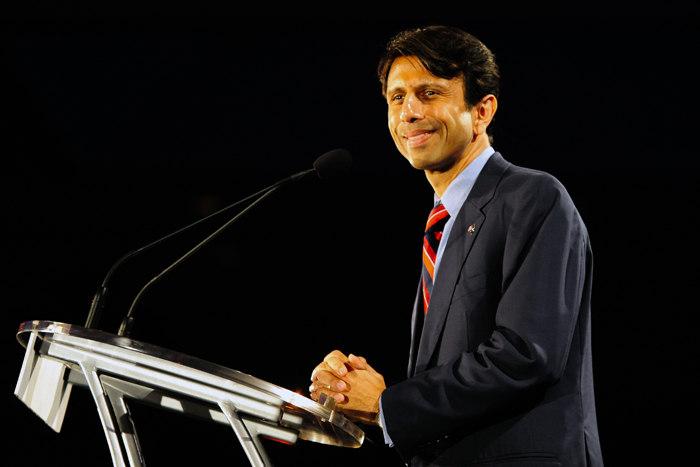The financial costs of the massive Gulf Coast oil spill are just beginning to become a political issue, with Democrats in Washington reluctant to divvy out any more taxpayer funds in an election year, especially for states whose governors have been among the most vocal over the past year in blasting federal spending.
In Louisiana, Gov. Bobby Jindal (R) has been a vocal critic of federal spending under President Obama, but as the state closest to the undersea leak, he already has requested various forms of federal disaster assistance. He’s also anticipating the possibility that British Petroleum either won’t, or won’t have to under the law, foot the the full cost of all the damages associated with the spill.
Sen. Bob Menendez (D-NJ) took a swipe at Jindal when I asked during a brief interview this week if Congress was considering any funding to add to what BP will do. “Well you know, here we go. You know, the governor of Louisiana says the federal government should stay out of the state’s business,” Menendez told me Tuesday night. Jindal’s office said they would respond but haven’t yet gotten back to me. We’ll update if they do.
Several lawmakers have told me in recent days that even though the spill is isolated to one location and BP is handling the cleanup costs, they fear a “ripple effect” that could cost someone millions. That’s why members are now wrangling over whether to increase the liability cap of $75 million. Some members of Congress told me that talks are under way for a potential supplemental measure to help the Gulf.
[TPM SLIDESHOW: Fire In The Gulf: New Pictures Of The Deepwater Horizon]
Menendez is pushing Congress to raise the liability cap because he sees astronomical costs to communities, fisheries, processors and the tourism industry including hotels and restaurants. He said it’s the “whole ripple effect of the economy when we have a disaster like this” that he’s worried about, adding, “I’m not quite sure why the administration continues to take the view that BP is responsible for everything. They are certainly responsible for everything related to the cleanup. … I’m not sure that liability is as extensive as they believe.”
Sen. Debbie Stabenow (D-MI) told me and a small group of reporters this week there is “certainly discussion” about some additional aid, though no decisions have been made.
“I wouldn’t be surprised at all if as we go forward you will see a supplemental,” she said.
“BP is the responsible party, not the taxpayers,” she said, but there will also be “the costs of everyone within the government,” including the Coast Guard.
But several other Hill sources I talked to said they think that’s doubtful. “There is not the appetite for that right now,” a House Democratic leadership aide told me bluntly in an interview. What’s more, lawmakers don’t view this as anything like the Katrina fallout since so much of the region’s infrastructure had been wiped out and so many people were displaced. The aide said the oil spill is much more isolated and that arguing the tourism industry would be hurt is unlikely to win over many votes on the House side.
Jindal, a potential presidential contender, has tussled with the administration over health care reform and accepting economic stimulus funds. He earned intense mocking for criticizing federal volcano monitoring funding. He’s boasted about what the stimulus has done for Louisiana as well.
But sure enough following the oil spill, Jindal’s office filed a request for federal funds, saying that “in an abundance of caution, we are seeking this preliminary approval should [the responsible party BP’s] plans fall short of meeting the needs of our people.” That contingency note was as Jindal asked for federal employment benefit services funding from the Department of Labor to help pay for “disaster related workforce training and job placement services and unemployment benefit services for workers displaced as a result of the oil spill.”
Jindal asked for Small Business Administration to approve more loans for local business owners by declaring an “Economic Injury Disaster Declaration.” He wrote a letter to the Department of Commerce asking for a declaration of “commercial fisheries failure” so that his administration “can begin the process of assuring the fishing community, impacted coastal residents and businesses that economic and financial assistance that are needed can be counted on to help get Louisiana fishermen back on the water once this crisis has passed.”
In public statements Jindal has stressed repeatedly that BP is responsible. He said the “worst-case scenario” plans are estimated to cost a total of $285.5 million and that he’s asked BP to fund them and the Coast Guard to approve them. “I want to reiterate again – this spill fundamentally threatens our way of life in Louisiana,” Jindal said recently.









